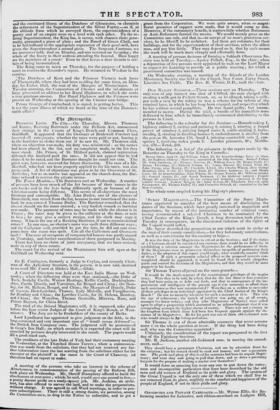r SURRY MAGISTRATES,— The Committee of the Surry Magis- trates
appointed to consider of the best means of discharging the duties of the Sessions, which have greatly increased in magnitude and importance, by reason of the increasing number of criminal cases, having recommended a salaried Chairman to be nominated by the Chief Justice of the King's Bench, a long discussion took place on Tuesday in consequence, on the threatened violation of the rights of the Unpaid would inflict. Mr. Speer described the proposition as one which went to strike at the root of their county constitution,—for they had county constitutions, as well as a constitution for the country at large— It was the duty of the Magistrates to attend at the Sessions; and if the duties of a Chairman should he considered too onerous, there would be DO difficulty in establishing; a rotation amongst the Magistrates for the performance of them. If the Magistrates were to pronounce themselves incapable of performing their duties, as the adoption of this report would imply, what would the country think of them ? If such a permanent salaried officer as the proposed measure con- templated should be appointed, it would be found that he would altogether guide and control the decisions of the Magistrates, and that they would be mere puppets in his hands.
Sir Thomas Turton objected on the same grounds— It would be the death-warrant of the constitutional privileges of the magic, tracv. Were they to be told he asked, that for the last three or four centuries they had been „0-oing on as dolts and fools, and that in consequence of the im- provement and intelligence of the present age it was necessary to afford them such assistance as that now recommended? Were they on a sudden to surrender all their privileges to an individual appointed by the Chief Justice of the King's Bench? He saw no necessity whatever for such a measure as this. This was the age of refinement ; the march of intellect was going on, at all events, amongst the lower orders ; and they (the Magistrates of Sorry) woe called upon to adopt a proposition which amounted to an acknowledgment that it was retrograding amongst the higher classes of society. There was not a county in the kingdom from which there had been less frequent appeals against the de- cisions of its Magistrates. He for his part was one of those old-fashioned men who would always be for letting well alone. Sir Thomas is one of those admirable reasoners that never assume more than the whole question at issue. If the thing had been doing well, why was the Committee appointed ?
Ultimately, the consideration of the report was postponed to the first day of the Epiphany Sessions. - Mr. R. Jackson, another old-fashioned man, in moving the amend- ment,
They should have a permanent Chairman, and one by education fitted for the situation; but his reward should be rank and honour, and not a pecuniary one. • The pride and glory of this land for centuries had been its unpaid Magis- tracy; and were they now going to pull that down, and to drive a pecuniary bargain for the purpose of making a master over themselves?
It would form an amusing list were any one to put down the nume- rous and incompatible particulars that have been described by the old men and old women of England as its pride and glory. The system of - the Great Unpaid is not the only one of these which we shall live to see removed from its place, mightily to the comfort and happiness of the people of England, if not to their pride and glory.


























 Previous page
Previous page